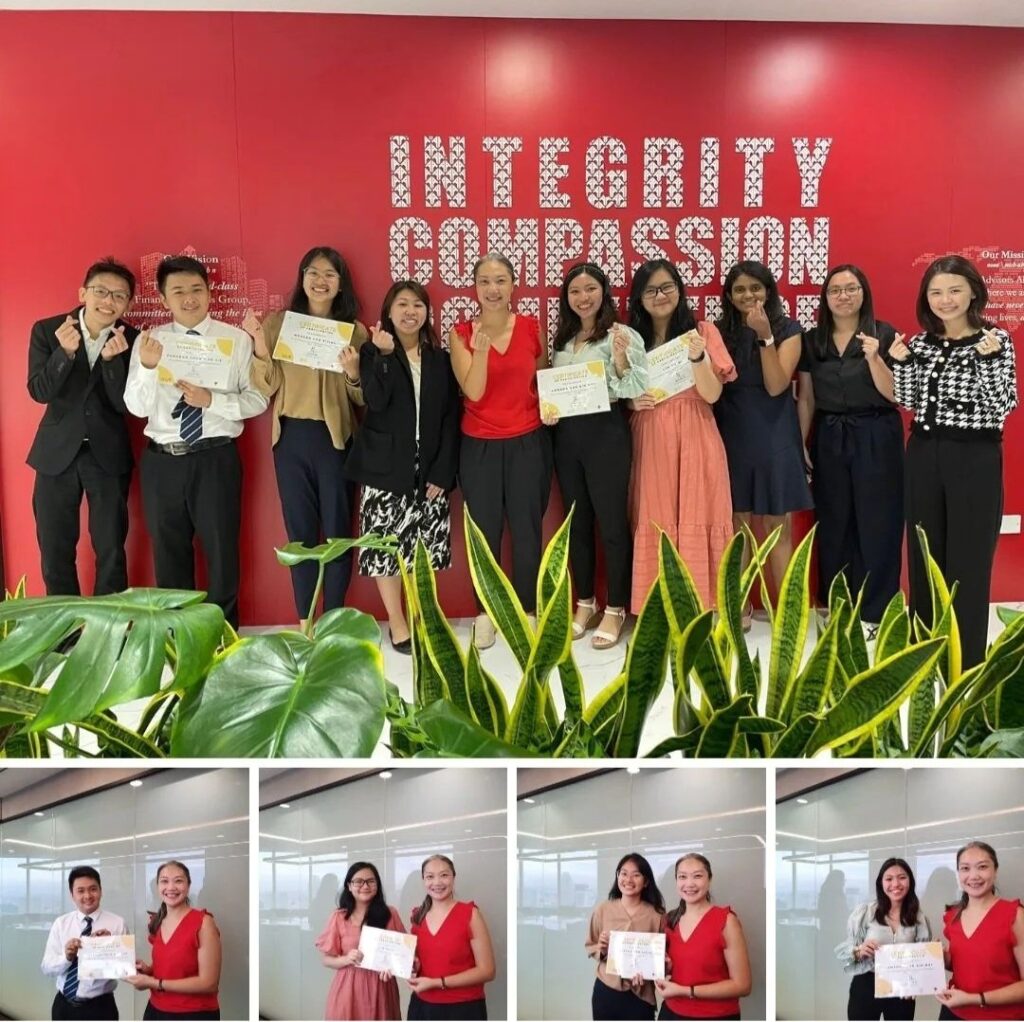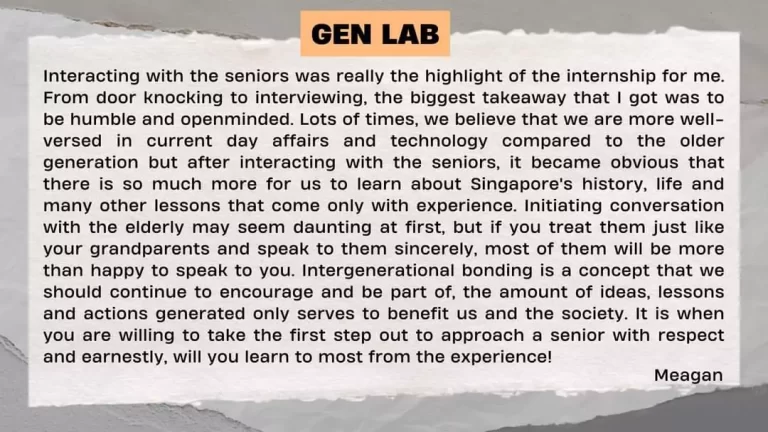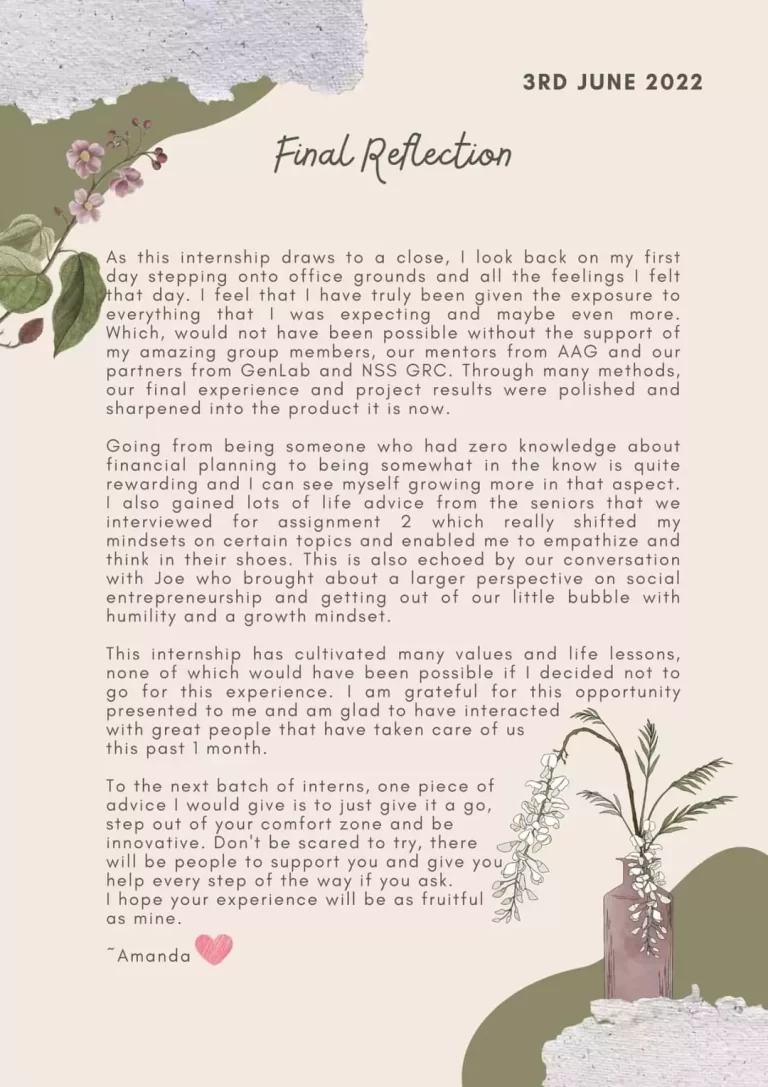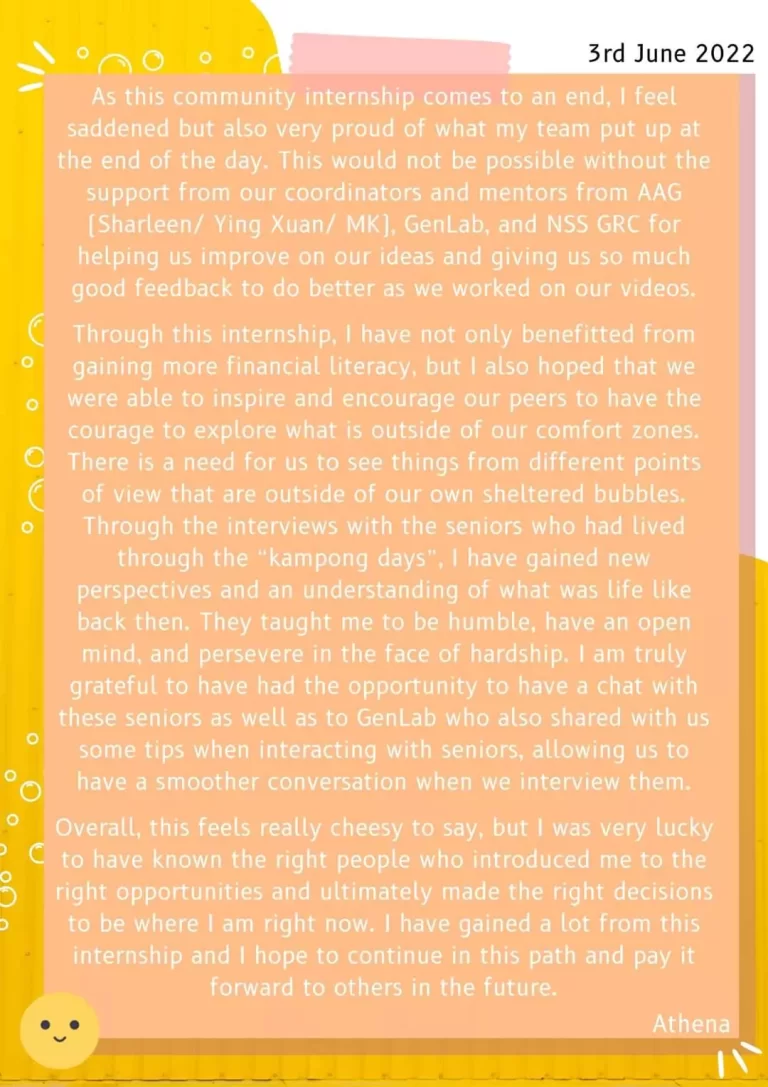
Written by Theodor Chua Wen-Jie, Volunteer with GenLab Collective
Have you ever wanted to do something meaningful, but didn’t know where to start? Maybe you have volunteered to help in your community club, but want something more? Or maybe, you just wanted experience working with a big company. All three sentences sum up my experience with the AAG Cares Community Innovation Internship. In the span of a month, my fellow interns and I created infographics for pre-retirees regarding retirement saving, sought out and interviewed multiple seniors, and produced an inspirational video for the youths of today. If that sounds interesting, then let me regale you with tales of the experience.
So Here’s a Little Story
To summarise, we had two major tasks to complete over the month. The first was a series of infographics catering to pre-retirees to educate them on the importance of retirement planning, and the second was centred on interviewing elderly in Nee Soon South to produce an inspirational video for the youths—on this front, we decided to focus on the theme of kampung spirit. The first week was focused on learning about the importance of financial planning and insurance, as well as discussions on our infographics. Following that, we finally met up with GenLab Collective Founder Keerthana and her team, who helped teach us important strategies and tips to interview the elderly for our second task. We then spent the next two weeks seeking out our candidates for interview, and eventually settled on three seniors who would share their stories with us. After interviewing them, the final week was spent editing and presenting the videos to all major shareholders, including GenLab Collective, AAG members and Nee Soon South GRC MP Carrie Tan. It was a fun and challenging time for us as we raced against the clock to accomplish our tasks. It was also very eye-opening as we learnt more about the history of our country and the times in the kampung.
There’s Always Going to Be Another Mountain
But of course, it wasn’t that easy, was it? Obviously, things went wrong every now and then. That was what made it fun and challenging though. There were the obvious ones, like technical issues (note to all: fans are loud, and can really mess up your audio), physical issues (apparently you can break a tripod with too much force) and probably the most pertinent one, personnel issues (thanks COVID!), which reduced our numbers from 6 to 4 and even 3 at one point. There were scheduling conflicts with other potential candidates, our door-to-door attempts were more often rejected, and there were times where we wondered if we would even have enough footage for the video. Perhaps the biggest challenge we faced was also our most interesting one, that being that our preconceived notions around the kampung spirit were fundamentally challenged by our first set of interviewees. Where the general vibe around the kampung spirit remains largely positive in the eyes of society—after all, there’s nothing wrong with a spirit of neighbourliness and cooperation—the reality was that spirit was the farthest thing on the minds of the early kampung dwellers, where daily life was a struggle for survival. Those interviews forced us to truly reconsider our approach to the video, but in hindsight, I believe those helped make the video much better overall.
Is This The Real Life?
On the topic of lessons learnt, there was certainly a lot we picked up on. The main thing, as previously mentioned, was about having our pre-conceived notions challenged and having to work around that, which was an important lesson about open-mindedness in general. You need to humble yourself and be accepting of alternate opinions that conflict with yours in order for an interview to go well. Another reality is that conducting interviews is significantly harder if there has not been a prior relationship established by the interviewers and interviewees. Part of the lessons with Genlab were centred on establishing a friendly rapport with the interviewees before conducting the interview, and it helped to make the interview feel more casual and less awkward, given that we chose to meet the interviewees a few days before the interview just to chat with them and get to know them. Probably the biggest personal lesson for me was that being personable rather than purely professional was more important. At the end of the day, the interviewees are still people who were willing to be open if we approached them with sincerity and kindness. It stood out to me as increasingly it feels there is a significant divide between the younger and older generations, and it has caused certain stereotypes to emerge where the elderly are out-of-touch, old-fashioned and nagging. The reality is that as younger people, we often do not make the first step to approach the elderly, as we assume they do not wish to share their stories with us, when they are in fact often willing to do so if we ask them with sincerity. As someone who struggled to communicate with my own grandfather, this internship really helped me to open up to him and begin chatting with him about life.
Time Seems to Fly but the Memories remain
The internship may have ended months ago, but the lessons learnt have remained. Contributions to the community do not have to be big and bombastic; every individual is part of the community, and sometimes just talking to them is enough to make their day better. Humility and open-mindedness are lessons that everyone should learn and traits everyone should have, especially in today’s society of political correctness and cancel culture. Rapport building goes a long way in not just establishing a good interview process, but a long-lasting relationship between both parties. The elderly are not just ‘boomers’ that don’t deserve our attention; they are people like us and deserve that respect and effort to hold meaningful conversations with. So if you feel that you want to make that difference, make that effort to bond with the older generation. It will be rewarding and meaningful in its own way. But don’t just take my word for it; here’s the other interns’ view of the internship:




